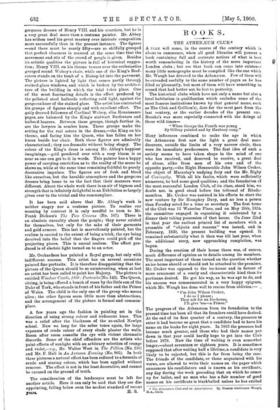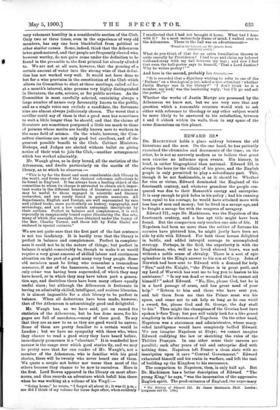BOOKS.
THE ATHEN/EITM CLUB.*
A TIME will come, in the course of the century which is about to commence, when all good libraries will possess a book containing full and accurate notices of what is best
worth remembering in the history of the more important London clubs ; but ere that book can come into existenee many little monographs must be compiled like the one which Mr. Waugh has devoted to the Athermlm. Few of them will be extended usefully to the same number of pages as he has filled so 'pleasantly, but most of them will have something to record that had better not be lost to posterity.
The historical clubs which have not only a name but also a local habitation (a qualification which excludes some of the most famous institutions known by that general name, such as The Club and Grillion's), date for the most part from the last century, or the earlier decades of the present one. Brooks's was more especially connected with the doings of those wild times- " When George the Fourth was young By Gillray painted and by Hanbury sung."
Many influences combined to make the age in which the Athetmum first saw the light a great deal more decorous, outside the limits of a very narrow circle, than were its immediate predecessors. The first idea of such a society seems to have taken shape in the mind of one who has received, and deserved to receive, a great deal of abuse, alike from men of his own and of the opposite party,—the Right Honourable John Wilson Croker, the object of lliacaulay's undying fury and the Mr. Rigby of Coningsby. With all his faults, which were sufficiently numerous, he had some good qualities ; and the foundation of the most successful London Club, of its class, stood him, we doubt not, in good stead before the tribunal of Rhada- manthus. Mr. Croker was assisted in his efforts to start the new venture by Sir Humphry Davy, and no less a person than Faraday acted for a time as secretary. The first home of the Club was 12 Waterloo Place, and on May 26th, 1824, the committee engaged in organising it celebrated by a dinner their taking possession of that house. On June 22nd in that year the earliest printed list of members with a preamble of "objects and reasons" was issued, and in February, 1830, the present building was opened. It remained substantially what it then was till last year, when the additional story, now approaching completion, was begun.
During the erection of their house there was, of course, much difference of opinion as to details among its members. The most important of these turned on the question whether an ice-house should or should not be attached to the premises.
Mr. Croker was opposed to the ice-house and in favour of more ornament of a costly and characteristic kind than its partisans desired. He got his way, as he was apt to do, and his success was commemorated in a very happy epigram, which Mr. Waugh has done well to rescue from oblivion :—
"I'm John Wilson Croker, I do as I please ;
They ask for an Ice-house,
I'll give 'em—a Frieze."
The progress of the Athenaeum from its foundation to the present time has been all that its founders could have desired. At the end of its first quarter of a century, the pressure to enter it had become so great that a candidate had to have his name on the books for eight years. In 1863 the pressure had become much greater, and those who had their names put down in that year could hardly hope to get into the Club before 1879. Now the time of waiting is even somewhat longer,—about seventeen or eighteen years. It is sometimes supposed that after waiting half a lifetime, a candidate is very likely to be rejected, but this is far from being the case. The friends of the candidate, or those acquainted with his works, are allowed to write their names on the paper which announces his candidature and is known as his certificate, any day during the week preceding that on which he comes up for ballot, and no man who has a fair number of good names on his certificate is blackballed unless he has excited
• The .4111E714:CUM Club and its Associations. By Frauds Glaistanes Waugh, M.A., 0.xou.
very vehement hostility in a considerable section of the Club. Only two or three times, even in the experience of very old members, has any one been blackballed from political or other similar causes. Some, indeed, think that the Athennm is too good-natured, and that people are frequently elected who, however worthy, do not quite come under the definition to be found in the preamble to the first printed list already alluded to. We are not at all sure, however, that the pouring of a certain amount of water into the strong wine of that defini- tion has not worked very well. It would not have done so but for a wise provision in the constitution of the Club which allows its Committee to elect at three meetings, called ad hoc at a month's interval, nine persons very highly distinguished in literature, the arts, science, or for public services. As the Committee is most carefully selected, containing always a large number of names very favourably known to the public, and as a single voice can exclude a candidate, the fortunate nine are almost always judiciously chosen. The worst that a caviller could say of them is that a good man has sometimes to wait a little longer than he should, and that the claims of
literature are sometimes postponed a little too much to those of persons whose merits are hardly known save to workers in the same field of science. On the whole, however, the Com-
mittee elections are not only good but excellent, and of the greatest possible benefit to the Club. Cabinet Ministers, Bishops, and Judges are elected without ballot on giving notice of their wish to join the Club,—another arrangement which has worked admirably.
Mr. Waugh gives, as in duty bound, all the statistics of the Athenmum, and dwells particularly on the merits of the library, as to which he observes:—
" This is by far the finest and most considerable club library in the world, and forms one of the choicest reference collections to be found in England. It has always been a leading object of the committee to whom its charge is entrusted to obtain such impor- tant works in the different branches of literature and science as may be useful to those engaged in scientific and literary researches, and are rarely found in private mansions. All departments, English and foreign, are well represented by rare and picked books, more particularly on history, topography, and archmology, and not a few contain autograph inscriptions by their authors. Perfect in balance and completeness, it is rich especially in sumptuously bound copies illustrating the fine arts, many of which (for example, those obtained under the legacy of the Rev. Charles Tumor, and those left by Felix Slade) are enclosed in special cabinets."
We are not quite sure that the first part of the last sentence is not too laudatory. It is hardly true that the library is perfect in balance and completeness. Perfect in complete- ness it could not be in the nature of things; but perfect in balance it might conceivably be, though to make it so would require a very great amount of skilled labour and continuous
attention on the part of a good many very busy people. Some old members must be living who remember a tremendous massacre, if not of the Innocents, at least of works whose only crime was having been superseded, of which they may have heard, or in which they may have taken part a genera- tion ago, and doubtless there have been many others equally useful since; but although the Athenteum is fortunate in having an admirably skilled, intelligent, and zealous librarian, it is almost impossible for a club library to be perfect in balance. When all deductions have been made, however, that of the Athenwum is astonishingly good and delightful.
Mr. Waugh has, as we have said, put on record the statistics of the Athenmum, but he has done more, for his pages are full of anecdotes,—many of them good. To say that they are as new to us as they are good would be untrue. Some of them are pretty familiar to a certain world in London ; but we have no sympathy with those who, when they chance to read a good story they have heard before, immediately pronounce it a "chestnut." It is wonderful how narrow is the range over which good stories fly, and we may be pretty sure that for one reader of Mr. Waugh's, not a member of the Athenasum, who is familiar with his good stories, there will be twenty who never heard one of them. We quote a couple not better nor worse than most of the others because they chance to be new to ourselves. Here is the first. Lord Bowen appeared in the library on most after- noons, and thus records an adventure which befell him there when he was working at a volume of his Virgil :—
"Going home," he wrote, "I forgot all about it; it was 11 p.m. ; nor did I think of my volume for three days after, when suddenly
I recollected that I had not brought it home. What had I done with it ? In a most melancholy frame of mind, I walked over to the Athenamm. There in the hall was an advertisement-
' Found in the Library, an MS. Quarto Hook containing Poetry.'
What do you think of that for an extra humiliation thrown in quite casually by Providence ? I had to go and claim my beloved waif-and-stray with my tail between my legs ; and now I feel that even the hall-porter says to himself, 'That a Lord Justice ? Why he writes poetry !' "
And here is the second, probably ben. trovato "It is recorded that a dignitary wishing to refer to one of the Fathers' on a theological point, asked a new attendant 'whether Justin Martyr was in the library?' ' I don't think he is a member, my lord,' was the hesitating reply, 'but I'll go and ask the porter.'" Whether the works of Justin Martyr are possessed by the Athenteum we know not, but we are very sure that any question which a reasonable creature would wish to ask either with reference to theology or any other subject would be more likely to be answered to his satisfaction, between 4 and 6 o'clock within its walls, than in any space of the same dimensions on this planet.







































 Previous page
Previous page